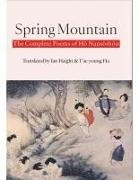Read more
The complete collection of poems by Nansŏrhŏn, a 16th century sequestered noblewoman and one of Korea’s first feminists in literature, considered by many Korean scholars to be Korea’s greatest poet.Nansŏrhŏn’s writes frequently in the Korean
han style of “deep sighs,” a thematically-styled poetry reminiscent of the Chinese “women poets of anguish,” practiced by writers such as Li, Ch’ing-chao (1084-1151). In this style, hardships that cannot be overcome but only endured are named and lamented: the death of children, abandonment by husbands, and destruction of households from war are a few examples. She did not lose the means to express her feelings, however, and her poetry remains as testament to the process of her responses to her life.
The feminism of Nansŏrhŏn begins with her education and the act of writing poetry. If a Korean noblewoman of this period wrote about progressive themes that challenged social norms, she had to express the ideas by using personas and troping traditional formal structures. Poetry written in this manner could then be defended by the noblewoman as simply practicing variations on poetic tradition, despite the subtextual commentary on abandonment, experiences or opinions on sequestering, larger questions about socialized gender roles and identity, or what it means to be an artist.
About the author
T’ae-yong Hŏ has been awarded translation grants from the Daesan Foundation and Korea Literature Translation Institute. With Ian Haight, he is the co-translator of
Borderland Roads: Selected Poems of Kyun Hŏ—finalist for KLTI’s Grand Prix Prize—and
Magnolia and Lotus: Selected Poems of Hyesim—finalist for ALTA’s Stryk Prize. Working from the original classical Korean hanmun, T’ae-yong’s translations of Korean poetry have appeared in
Agni,
New Orleans Review, and
Prairie Schooner.

